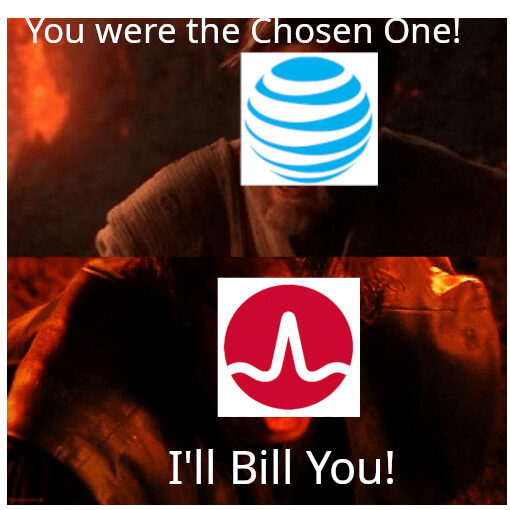Schadenfreude would feel better if it also brought about a new round of break-ups…

Ever since Broadcom’s disastrous take-over of VMWare, a company best known in the Dork-o-Sphere of Tech for its ESXi Virtualization platform, cloud solutions, and VMWare Workstation/Fusion/Pro offerings, has been nothing but turbulence. Broadcom seems largely hellbent on making sure they take whatever Golden Goose it got from VMWare’s $69 billion acquisition and crashing it to the ground, scavenging whatever patents it can gut along the way. Anyone has lived through the rise and fall of organizations like this knows that the inevitable fate of the VMWare brand will be to wander through life as a Chinese-owned Zombie Brand, long removed of its original purpose or spirit.
But until we get to that point, little is standing in the way of Broadcom and its gamble that its largest clients will pay anything, literally anything, before they will even begin to humor the idea of moving to a new platform. This is in part because the ecosystem surrounding existing VMWare products is extremely mature and, if we’re being honest, not always easily replaced. Heck, some of their most advanced features simply completely lack FOSS (or proprietary) alternatives on the market at all, at least as one complete solution. Couple this with the snails-paced movement of most major corporations, the lack of executive interest to invest in staff knowledge and tool diversity, and an unwillingness to deal with the slightest amount of downtime, and they aren’t exactly wrong in their gamble. At least, probably not entirely…
Queue Broadcom’s latest spat with another organization compiled of largely Giant Assholes who believe their customers too stupid, lazy, and ill-prepared to move away from them: AT&T. it seems that recently, the OG monopoly and perpetual bad-guy for decades found itself negotiating its VMWare contracts with the newly-minted Broadcom VMWare, and was hit with a staggering increase of over 1,050%! For context, AT&T looks to have north of 70,000 virtual machines, spanning nearly 9,000 servers, and probably maintains operations all around the world. Now, the documents I’ve read so far did not disclose an exact number of what this renewal would be for the organization, but they did publicly state that migrating away from VMWare’s solutions would cost them something in the ballpark of $40 to $50 million. We can guesstimate a little bit that if this is their migratory costs, this contract is pretty hefty when intact. We could probably visualize it by saying if Broadcom was Sean “Diddy” Combs, this contract could supply millions and millions…. and millions… of bottles of baby oil from the local Costco. You know, like totally normal, not-at-all crazy weido people tend to buy in bulk.
On the surface, I can’t help but laugh at AT&T’s plight. Organizationally, AT&T has spent the better part of a hundred years doing everything it can to craft, maintain, legislate, and facilitate its own monopolistic practices. They are heavy players in political lobbying and donate massive sums of money to lawmakers in the US to help maintain their long-standing predatory and hostile corporate behaviors. Hell, even after being split up in the 80’s, all they did was wait a decade or so and largely re-purchase all the exact companies they had to split into, and regulators just snoozed on it!

I couldn’t help but meme on it, so enjoy my delightful work in GIMP over to the right, and relish in my stunning artistic prowess — it’s literally undeniable — Almost as undeniable as how AT&T hilariously helped make an environment ripe for these kinds of practices to take place, only to find themselves in the crosshair of a monster they created.
But with all joking aside, it does truly show a dark and unstable point in an ever-increasingly consolidated, narrowed, and limited “free market”. Broadcom didn’t buy VMWare to improve it, they bought it because they knew it was an industry standard for many companies out there, and while AT&T’s story might be the most severe (to date) and the most public, its not the only one we know about. Many companies, large and small alike, found themselves reeling after the acquisition saw bad-faith price increases on their services. Services that, for some companies, truly are a foundational piece of the organizations infrastructure and very well might directly influence their profitability. It may even strip a smaller organization of the ability to reach profitability at all, and with limited cash flow and head count, may remove any way for them to move to alternatives.
The other issue is competition and viability of the market. Broadcom knew when they purchased VMWare that the nearest competitive solutions were still miles behind the tool they were purchasing. Microsoft’s Hyper-V might offer some nice native integrations, but the entire project is still far in the rear-view mirror of VMWare’s solutions. In the Open Source Software space, the distance between the two is even greater. Proxmox is great, but few people are going to have staff already trained in it, and it is far from a single-source solution for what some VMWare customers use. VirtualBox… Exists…. Qemu is a lot of fun, and I enjoy playing with it, but I realistically struggle to see how this would help an organization more deeply ingrained in the VMWare ecosystem. Especially organizations that heavily rely on ESXi, the integrated back-up solutions, hot-restores, and every other feature sets that can make the tool so compelling to begin with.
Broadcom knew all this when they made the move on VMWare. They knew that many organizations had spent literal decades building up production infrastructure in the ecosystem. They knew that many organizations had never truly considered migratory plans, or even thought about alternatives at all, leaving them in a hostage situation when the hammer dropped. It would seem that Broadcom’s end goal is to saddle their existing contracts with as much operational expense as possible to offset any losses they’ll see from departing customers and lack of new investment.
For the life of me, I cannot figure out what their end-goal is with the product except to drive it to the ground, tell the staff working there “Well, that really sucks huh? sorry for the layoffs!”, stripping its patents down to the core and squatting on them for licensing fees, and finally selling the schucked shell of the brand down the line to some organization who may use the branding in bad faith. It’s sad to see, and above all else it’s a serious warning sign.
Over the last 30 years, the diversity of the market has found itself shrinking and circling an ever smaller, ever more powerful list of conglomerate companies. They promise low prices, more innovation, better customer satisfaction, and more choices… But that’s just not how markets work. When there is no one left to complete, there is no incentive left to make a decent product. Worse yet, if there is no room for new contenders to enter a market, there is no (or virtually no) chance for new organizations to get off the ground and gain traction. Innovation will die in these circumstances and the US tech sector alone will shrivel up and lose relevance, leaving us even further behind than we have already been in the last couple of decades.
I am glad to see more people waking up to these realities, it felt like a good chunk of my youth and early adulthood was surrounded by adults that professionally huffed fumes straight from the asses of corporations. Convincing themselves that the companies could do no wrong, the richest at the top were infallible, and the gains of Wall Street would translate to Main Street.
Those things never came to pass, but we did see our freedoms, choices, and innovation all start drying up and disappearing… And make no mistake, while VMWare may mostly impact organizations, it will be the customers who inevitably foot these bills and offset the costs until (or even if) something better comes along. And it’ll mean juuuuuuust that much more taken from the rest of us along the way….
That’s all…
Bye bye.
